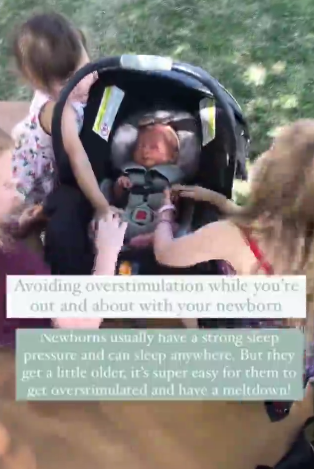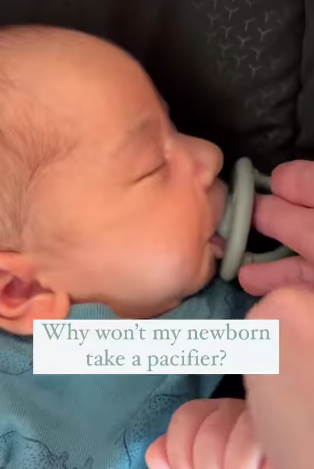It’s shocking. And extremely stressful. Frustrating and unfair. Your newborn was supposed to be asleep hours ago. How is this even humanly possible? The truth of the matter is, if your newborn is not sleeping during the day, it is very likely not a coincidence.
There are several factors that can contribute to why your newborn is wide awake when they should have been asleep hours ago. And this is also a baby sleep situation that is preventable AND solvable!
In this post, I will break down the reasons why your newborn is not sleeping during the day, and how to get your newborn napping so you are both a lot happier!
Reasons why your newborn is not sleeping during the day
How to get your newborn napping
Reasons why your newborn is not sleeping during the day
Overtired
Being overtired is the most likely reason why your newborn is awake instead of napping, as newborns have VERY short wake windows and can become overtired very easily. Once a newborn becomes overtired, it becomes extremely difficult to get them to sleep. Preventing overtiredness is the key to success when it comes to baby sleep.

Undertired
Although it is less common (especially in newborns) it is possible that your newborn is not sleeping during the day because they are getting too much overall sleep per 24 hrs.
On average, newborns get 16-18 hours of sleep per 24 hours, and 9-10 of those hours occur at night (broken for feedings, of course!) And don’t forget that every baby is different, so if your newborn is getting a little more or a little less sleep than these averages and they are happy and seem well rested, then no need to change anything.
However, if your newborn is not sleeping during the day and they are getting much more sleep during the nighttime hours of the day than these averages, then consider shifting their schedule a bit to see if you can more evenly distribute their sleep throughout a 24-hour period.
Overstimulated
This is a big one, and unfortunately a common one. Did you hear about the time I took my newborn to a baseball game? Well, it was a disaster. Waaayyyy too overstimulating. It took her HOURS to finally go to sleep. I definitely learned an important lesson about overstimulation.
Newborns are sensitive to bright lights, loud noises, and commotion going on around them. Plus, they have very short wake windows. So if you are going to take your newborn out and about, make sure that you still follow age-appropriate wake windows. And if you are out and getting close to the end of a wake window, you can still do a nap on the go! Just use a well ventilated car seat cover and a portable sound machine to create a newborn friendly sleep environment.
Check out my Instagram Reel for tips on avoiding overstimulation when you are out and about. Click here or on the image below:
Tummy Troubles
Just like us, newborns find it hard to sleep if they are uncomfortable or in pain. However, unlike us, they cannot tell us what is wrong. Instead, we are left playing detective.
There are several potential culprits to your baby being gassy and uncomfortable:
- Tongue and lip tie
- Incorrect bottle
- Food intolerance
- Reflux
If you suspect that tummy troubles may be the reason why your newborn is not sleeping well, then the first step would be getting to the root of the issue, and as always, speak to your pediatrician!
Hungry
Again, just like us, your newborn is not going to happily drift off to sleep if they are hungry. And again, it is hard to tell if a newborn is legitimately hungry, especially when not only do they love to suck, but their only method of communication is crying.

The extra fun (read: tricky) part is that getting good full feeds is a bit of a thing. To ensure your newborn gets a good full feed so they can go to sleep without being hungry, keep them awake for the entire feed. Feeding BEFORE sleep is totally fine, but we want to avoid feeding TO sleep.
This is especially true for breastfeeding Mamas as during a nursing session your baby gets foremilk at the beginning and hindmilk at the end. And it’s the hindmilk that is nice and fatty and filling!
The 3-Month Sleep Regression
The 3-month sleep regression is notorious for being the “crap nap” sleep regression. Meaning nighttime sleep is all good, but daytime sleep has fallen apart.
If this sounds like your newborn, then check out my Instagram Reel by clicking here or on the image below:
How to get your newborn napping during the day
Now that you know the reasons why your newborn may not be sleeping during the day, I’m going to dive into the content you are really here for: how to get your newborn sleeping during the day.
Wake windows and sleepy cues
Let me say it one more time for the people in the back: preventing overtiredness is the key to baby sleep. And the way you prevent overtiredness is twofold.
- Follow age appropriate wake windows
- Catch your newborns sleepy cues and get them to sleep BEFORE they become tired.

Most parents are surprised at how short newborn wake windows are. You tell me if you are one of those parents. Ready? Newborn wake windows are 60-90 minutes. That’s right- super short! And how do you tell, within this window, when it’s time for YOUR baby to get to bed? Catch their sleepy cues!
Sleepy cues are different from tired cues. Many parents think that fussing and rubbing eyes are signs that it is time to get their baby to sleep, however these are actually TIRED cues. You watch to catch your baby’s sleepy cues before they become tired.
Sleepy cues are:
- Eyes are staring off into the distance
- A calm, peaceful demeanor
- A subtle yawn
- Reddish hue on their eyebrows and eyelids.
So watch the clock AND your baby’s cues to know when to get your baby to sleep, so you can prevent overtiredness. If you are able to do this, you will find your baby easily falls asleep during the day for their naps.
Calming tricks
If your baby is losing their bananas and you know they need to sleep but it doesn’t seem to be happening, try my six soothing techniques.
The Six S’s:
Swaddle: Newborns love when their environment mimics the womb, so use a snug swaddle that isn’t too tight that it restricts hip movement, but isn’t too loose that it can come undone.
Suck: Newborns are soothed by sucking, so offering a pacifier can be helpful! It’s normal for it to take some time for baby to get the hang of it, so keep practicing.
Check out my Instagram Reel on tips for introducing a pacifier by clicking here or on the image below:
Shushing: Mimic the sounds of the womb by making a whooshing sound in baby’s ear, or use a sound machine.
Side Position: We know it’s important to always put baby to sleep on their back, but if you are doing a contact nap where you are awake and supervising, have your baby lie on their side, snug to your body to mitigate their Moro reflex.
Swing: Babies love motion, so you can rock or gently jiggle your baby against the side of your body.
Stroke: This one is my magic bullet! Stroke your baby’s eyebrows or run your fingers from their forehead down their nose. Babies find this soothing and it encourages them to close their eyes.
Check out the eyebrow stroke in action by clicking here or on the image below:
Layer on a few (or all) of these and your newborn will be sleeping in no time!
Curing Tummy Troubles
It’s truly heartbreaking when our newborns are uncomfortable or in pain. And it’s even worse when we don’t know why!
Tummy troubles are common in newborns and if you suspect this may be the issue, here are some things to consider:
1. Get that gas out!
Check out this magic burping technique by clicking here or on the image below:
2. Check for tongue/lip tie
3. Try a different bottle
4. Assess for reflux
5. Evaluate your diet
Getting to the bottom of your newborn’s tummy troubles means playing detective and ruling out different potential issues. I have a whole post on “How to Help a Gassy Baby” and as always, please speak to your pediatrician for any of your tummy trouble concerns.
What to do when you have a newborn not sleeping during the day recap

When you have a newborn not sleeping during the day, it’s incredibly stressful and frustrating. And the fact that they are not sleeping during the day probably means they are becoming overtired, which means you are likely having more wake-ups than needed throughout the night.
Once you understand the potential reasons why your newborn is not sleeping during the day, you can work to get to the root of the problem and have your newborn following age-appropriate wake windows and falling asleep easily for every nap.
My 0-4 Months Content Library, with a full video course and written guides, teaches you the fundamentals of healthy sleep, and how to decipher your baby’s cues to meet their needs.
You’ll learn exactly what you need to do to keep them happy, content, and sleeping well!
Access the 0-4 Months Content Library here!








0 Comments